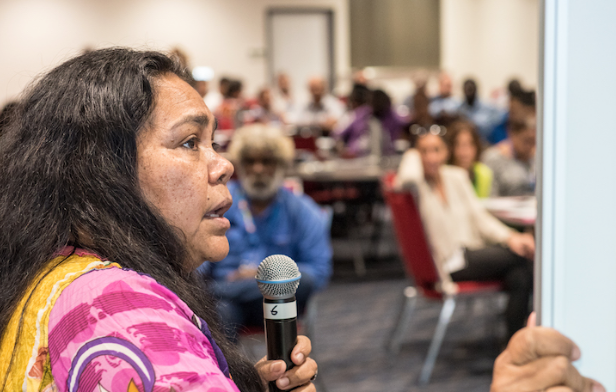Participants at the most recent in a series of First Nations Regional Dialogues being held around the country have called for the fire of Aboriginal unity and activism to burn strongly again.
Around 100 people attended the Darwin Regional Dialogue on 22-24 February 2017.
Following a discussion on the correlation between Aboriginal activism and rights since the late 1800s in Australia, Darwin delegates said the fire was still there to unite. While the fire was dim, it needs to burn strong again, with First Nations across Australia uniting on proper change for the country.

Darwin delegates did not want the Constitutional reform process to be rushed and indicated they feel they are being rushed. Delegates were clear that communities need time to have a conversation about the options for reform.
Just as during previous Regional Dialogues, agreement making or Treaty and Aboriginal governance was a dominant topic in Darwin.
Darwin participants preferred the word Constitutional "reform" to "recognition". Co-Chair of the Referendum Council Patricia Anderson AO said, ‘a common theme is emerging across the regions. People don’t want endless consultations. People want change’.
In relation to changing the text of the Constitution, a new, elected Indigenous voice to Parliament was the number one preference. Participants noted that the Indigenous Advisory Council (IAC) was handpicked and limited to an advisory role. In addition, because it was not elected from the grassroots, it did not have legitimacy within communities.
There was a suggestion that any new voice to the Parliament be accompanied by a Tribal Elders Council to ensure that cultural authority was provided to the work of the new body.
The racial non-discrimination clause was highly ranked during the Darwin Dialogue. This is because of the dual impact of the race power and territories power on the Northern Territory, which provides the Commonwealth with broad plenary power to makes laws that are potentially racially discriminatory, such as the Northern Territory Intervention.
The harsh impact of the Intervention was acknowledged by the group and that the Racial Discrimination Act binds everyone except the Federal Parliament.
The loss of funding and community control experienced by local and remote communities due to The Northern Territory Emergency Response (NTER), the Indigenous Advancement Strategy and local government reforms in the Northern Territory, has diminished trust in governments.
The participants said that removing the word "race" from the races power and inserting "Aboriginal and Torres Strait Islander peoples" does not in fact remove racism. Rather, in the absence of words of limitation in the power or a guarantee against racial discriminatory laws by the Federal Parliament, racist laws could continue to be made.
Delegates at the Darwin Dialogue expressed concern about what happens after the National Indigenous Constitutional Convention in Uluru in May. They do not want the Aboriginal package to be handed to the Referendum Council and then to politicians without a further negotiation period. They want to ensure that First Nations people are not excluded from final negotiations on a question that "recognised" them.